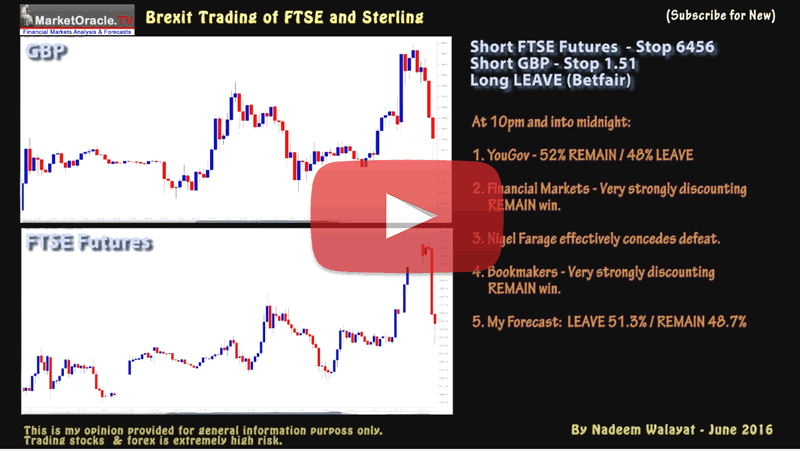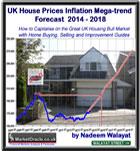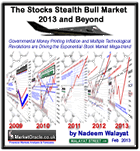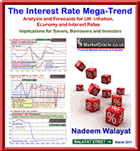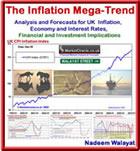BrExit Implications for UK Economy, Interest Rates, Bonds, Markets, Debt & Deficit, Inflation...
Economics / UK Economy Jul 04, 2016 - 07:20 AM GMTBy: Nadeem_Walayat
 On Thursday 23rd of June 2016 the people of Britain voted to LEAVE the European Union surprising all including politicians, financial markets, big businesses, pollsters, bookmakers and even prominent LEAVE campaigners such as Nigel Farage who conceded defeat shortly after the polls closed at 10pm only to start backtracking a couple of hours later. The apparent surprise result that confounded most expectations has led to a spike in market and policy uncertainty as within hours of the decision David Cameron announced that he would be stepping down as PM and thus triggering a Tory leadership contest. Whilst Labour apparently went one step further by completely self destructing as 75% of Westminister Labour MP's attempt to eject Jeremy Corbyn, a civil war that looks set to destroy the Labour party. So Britain today remains rudderless without a functioning government or opposition let alone any idea of exactly how a BrExit vote will translate into real world impacts in every day peoples lives where now major business and economic decisions have been put on hold.
On Thursday 23rd of June 2016 the people of Britain voted to LEAVE the European Union surprising all including politicians, financial markets, big businesses, pollsters, bookmakers and even prominent LEAVE campaigners such as Nigel Farage who conceded defeat shortly after the polls closed at 10pm only to start backtracking a couple of hours later. The apparent surprise result that confounded most expectations has led to a spike in market and policy uncertainty as within hours of the decision David Cameron announced that he would be stepping down as PM and thus triggering a Tory leadership contest. Whilst Labour apparently went one step further by completely self destructing as 75% of Westminister Labour MP's attempt to eject Jeremy Corbyn, a civil war that looks set to destroy the Labour party. So Britain today remains rudderless without a functioning government or opposition let alone any idea of exactly how a BrExit vote will translate into real world impacts in every day peoples lives where now major business and economic decisions have been put on hold.
So whilst the Bank of England was able to contain the immediate market panic. Nevertheless the economic uncertainty remains extremely high with the potential for many years of confidence draining paralysis as businesses and investors indefinitely put off making major decisions until they can see what BrExit will actually look like. Therefore this comprehensive analysis looks at ten major drivers of the UK economy, of what to expect to happen next that builds on year long analysis of what would follow post Brexit:
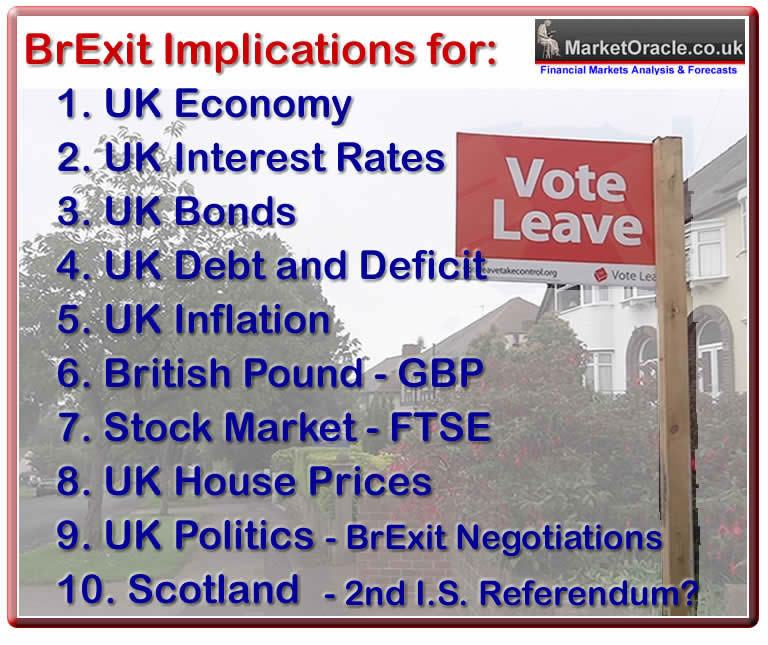
But first a quick recap of what actually happened on BrExit night that caught virtually ALL by surprise in this video of my selection of the highlights from 8 hours of BBC coverage of the EU Referendum result.
And this trading markets video illustrates how all hell broke lose once the polls closed Thursday 23rd June as the markets, bookmakers and pollsters ALL got the EU Referendum very badly wrong following YouGov's 10pm poll that had convinced all, even Nigel Farage that REMAIN had won triggering a further sharp rally in sterling and FTSE futures that was sustained until the actual results started to be announced shortly after midnight.
1. UK Economy - 2% GDP Price for Freedom
The UK economy WILL take a hit as I have often warned to expect a loss of GDP of between 2% and 4% over the next 2 to 3 years depending on Europe's stance taken during the BrExit negotiations, where the early voices from the likes of Juncker are very threatening demanding that the UK immediately starts the process for leaving the EU by means of triggering Article 50. However, I think things will calm down and Europe will become more amicable than today's rhetoric because europe is structurally and symmetrically very weak that Brexit has just weakened further. So in terms of GDP the hit will probably turn out to be closer to 2% then 4% as more sensible heads start to prevail.
The REMAIN camps 'Operation Fear' had Osborne's announcing an emergency Brexit tax hike and spending cuts budget which has apparently now evaporated. Instead expect Osborne ( for as long as he remains chancellor) to announce the exact opposite i.e. a stimulus budget, probably pumping an extra £30-£50 billion into the UK economy that I am sure will please the stock market some more. With Osbornes latest utterance that he intends on cutting in Corporation Tax from 20% to 15% which would compare against 30% in Germany and 39% in the US.
The Bank of England prior to the BrExit vote warned of a technical recession. Now post brexit the BoE is bending over backwards to support the UK economy through monetary stimulus. However also warning that it may not be enough to overcome economic weakness.
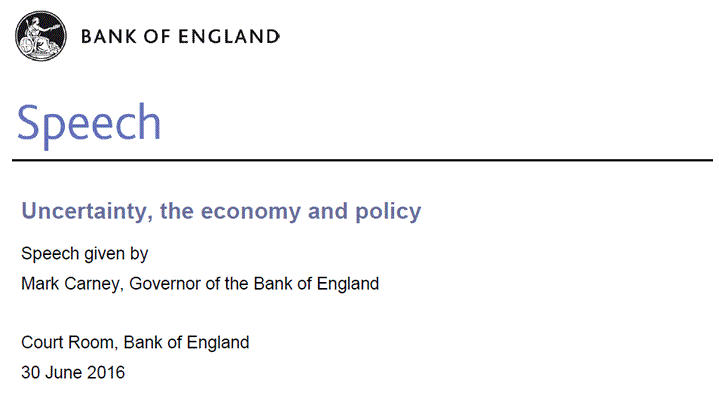
Key points:
"Monetary policy cannot immediately of fully offset the economic implications of a large, negative shock," he said.
"The future potential of this economy and its implications for jobs, real wages and wealth are not the gifts of monetary policy makers.
"This will be driven by much bigger decisions; by bigger plans that are being formulated by others."
"The question is not whether the UK will adjust but rather how quickly and how well,"
In terms of the Banks view on the level of UK economic uncertainty i.e. how the economy will perform against forecast expectations, then as the following chart demonstrates that BrExit is currently being perceived as generating economic uncertainty of nowhere near that of Lehman brothers, the euro-zone crisis or the ERM crisis of 1992. Instead in terms of economic uncertainty ranks along the lines of the LTCM crisis and the Bush and Blair invasion of Iraq.
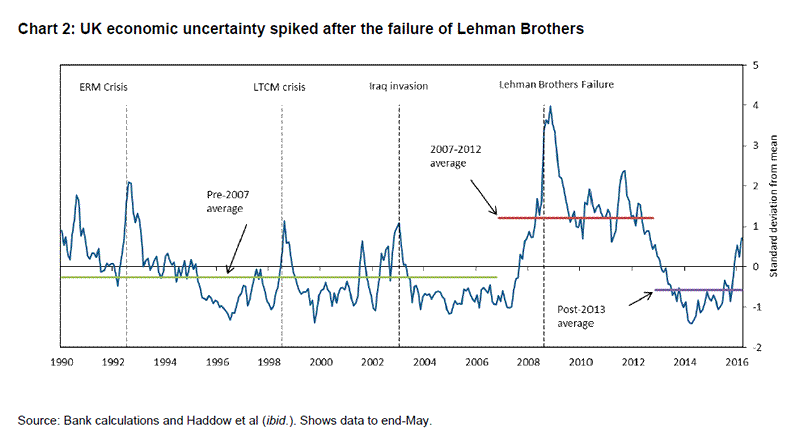
However, when considering UK economic policy uncertainty i.e. market perception of the uncertainty of future government or central bank economic policies on the basis of which to make investment decisions upon, i.e. such as uncertainty created around the consequences of negative interest rates. So it should not come as much surprise that in terms of economic policy uncertainty of what the Government or Bank of England will do going forward as the UK withdraws from the European Union, has resulted in an economic policy uncertainty spike which lends itself to greater market volatility as we have been witnessing this year and thus likely to continue going forward.
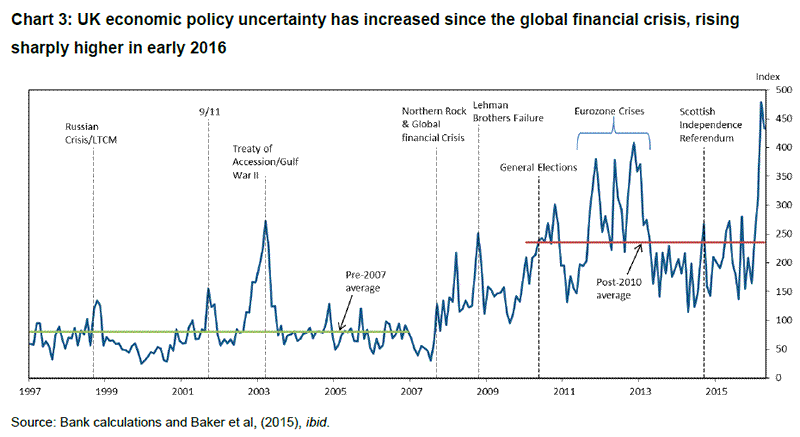
In terms of the outlook for the UK economy then expect the Treasury, OBR and Bank of England to once more downgrade the prospects for UK growth this year. With early economic voices coalescing around UK GDP of just 1% for 2016 and probable recession for 2017 with these reports to materialise over the coming months.
The OBR last downgraded UK growth in March 2016, as the following illustrates:
- 2016 : 2.0% from 2.4
- 2017 : 2.2% from 2.5
- 2018 : 2.1% from 2.4
- 2019 : 2.1% from 2.4
- 2020 : 2.1% from 2.3
And the OBR was expected to publish its next report this month (July) but apparently that has now been cancelled which now won't appear until November or December.
Whilst my longstanding UK GDP growth forecast is :
06 Feb 2016 - UK Interest Rates, Economy GDP Forecasts 2016 and 2017 )
UK Economy
The oil price collapse has triggered a huge transfer of wealth from England to Scotland to prevent a collapse of the Scottish economy following what will probably turn out to be the slow death of the North Sea oil industry which requires an oil price of approx $60 just to break even let alone the likes of $100+ to finance new expensive operations that the fantasy land Scottish Nationalists had propagandised during the 2014 Independence Referendum and delusionally continue to cling onto to this day when the truth is that Scotland's oil party is well and truly over!
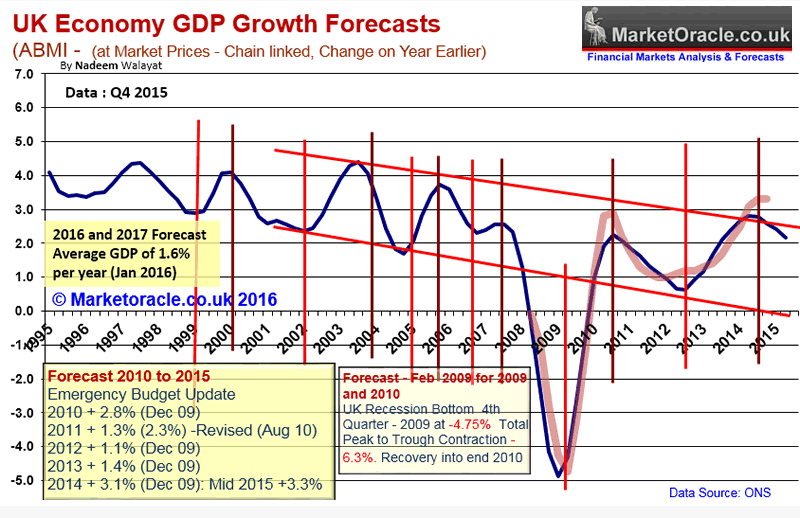
Nevertheless the support for Scotland, a weak european economy and evaporating Chinese demand are all acting to drag down UK GDP to imminently a sub 2% rate. However, whilst a recession does not appear to be on the cards the slowdown in momentum is such that the UK looks set to dip to an annualised growth rate of below 1.5% and may even touch bottom at 1% which compares against the engineered mini-election boom of 2.8% in the run upto the May 2015 general election.
Therefore, as usually tends to be the case for post election economic slowdowns, then the next 2 years are likely to be weak (2016, 2017) with GDP probably going to average at a rate of about 1.6% for each year which compares against the Bank of England's economic propaganda expectations of 2.5% for 2016 and 2.7% for 2017.
Also see:
The Economic Cost of BrExit
So in terms of the costs of Brexit to the UK economy and taking account of the forecast range of 2% to 4% GDP over the next couple of years, then post Brexit my conclusion is that the hit is probably going to be nearer to 2% then 4%, so the UK is approximately going to take a 2.6% GDP hit. Whilst my forecast of February 2016 had factored in a hit of between 1.6% and 2.1%.
However, the outcome for 2016 will likely turn out to be bang on my forecast of 1.6% GDP. Therefore the real hit of Brexit will be felt in 2017 where instead of my forecast growth of 1% to 1.6%, the UK economy could flat line at probably around 0.5% growth! And that is how I expect the 2.6% cost of Brexit to manifest itself.
So as I have repeatedly warned, FREEDOM does carry a price and that price now looks set to be approx 2.6% of GDP which is set against my pre-brexit expectations for a 1.6% to 2.1% cost. So whilst it will be painful, however it won't be as bad as ANY of the recessions of the past 40 years! AND DON'T FORGET that the economic IMPACT of BREXIT will be GREATER on the EU than on the UK!
2. UK Interest Rate Cuts and More QE
The establishments operation fear had painted a relentless propaganda picture all year for a significant rise in UK interest rates following a Brexit outcome that was destined to send consumer borrowing rates soaring, which at the time I repeatedly warned was just NOT going to happen for the fundamental reason that BrExit induced uncertainty would make a rate hike LESS likely as the last thing the Bank of England would want to do is to add to market uncertainty i.e. the complete opposite to REMAIN propaganda. In fact I stated that a BrExit could even result in a rate CUT as the following excerpt illustrates:
06 Feb 2016 - UK Interest Rates, Economy GDP Forecasts 2016 and 2017
UK Interest Rates Conclusion
Therefore the overwhelming picture is one of the Bank of England continuing to kick the interest rate can down the road for the whole of 2016 and probably for the whole of 2017 too, even if inflation rises to above 2%. Where even a BrExit induced mini-sterling crisis is unlikely to prompt the BoE to shift on UK interest rates. Especially as I expect the UK economy to significantly weaken to an average GDP of 1.6% per annum that compares against BoE expectations of 2.6% per annum.
The bottom line is that a paralysed BoE remains terrified of its banking brethren that could yet go bankrupt again, especially given Britain's continually expanding debt mountain, and thus will only hike rates when it is faced with an even worse crisis. In fact odds probably favour a CUT in interest rates rather than a RISE, maybe even going negative, though negative interest rates just do not work because they act as a tax on the economy instead of a stimulus.
Market Implications
Low borrowing costs and savings interest rates are likely to continue to persist for the next 2 years. Therefore savers should eye fixes of at least 2 years for higher rates. Bank customers also need to be aware that there is a real risk of NEGATIVE interest rates, which means the BANKS will STEAL a percentage of your bank deposits each year. That's right, the banks take your bank deposit, loan it out at 5%, 10%, or 20% and then will CHARGE you for allowing them to do so with your money. If this is not the behaviour of crime syndicate then what is it?
Expect further ongoing weakness for sterling, a trend forecast for which will follow in a separate analysis. Lack of rate hikes and the prospects for further easing are supportive of the stock and housing markets for 2016.
And again the accompanying video analysis:
So where do we stand now that BrExit has happened?
The S&P has apparently downgraded Britain from its Triple AAA credit rating that it has held since 1978, even through the worst of the financial crisis to now AA. Though against the S&P also downgraded the whole of the European Union block from AA+ to AA though that masks internal differences of for instance Spain on BBB+, Greece B-, France AA, Italy BBB-1, In fact its only Germany with a higher credit rating than Britain of AAA. So where where ratings are concerned its always a case of where a nation stands relative to others, in which case the ratings as things stand today won't result in any real market impact, i.e. implied higher borrowing costs are NOT happening, instead borrowing costs have become CHEAPER post BrExit.
Whilst the Bank of England's panicky statements and actions post BrExit make things crystal clear that :
a. The Bank of England rather than raising interest rates is instead likely to CUT interest rates over the coming months and probably quite soon, even at this months MPC meeting. Though whilst negative interest rates are possible, they are not probable because they would have a negative impact on banking sector profitability i.e. may have the opposite effect on the economy than intended.
b. That the Bank of England is making available upto £250 billion for its banking brethren, to effectively lap up free money to trundle along and invest in government and corporate and of course the stock market, which means the potential £250 billion is QE in all but name! And you don't have to look far to see the effect that it has already had in sending stocks soaring into the stratosphere!
c. That the Bank of England is going to undertake more official QE, that's print more money on top of the estimated £500 billion to date, probably at least another £100 billion of QE over the next 12 months to inject into the UK economy via the banking sector primarily through the buying of government bonds i.e. monetizing UK government debt which has the effect of reducing Britains debt burden at the cost of inflation as printing money to monetize debt tends to push currencies lower. Though with the Pound already having fallen by about 12% then much of that has already been priced into the market.

Mark Carney key points concerning interest rates and QE :
"In my view, and I am not pre-judging the views of the other independent Monetary Policy Committee (MPC) members, the economic outlook has deteriorated and some monetary policy easing will likely be required over the summer,"
"As we have seen elsewhere, if interest rates are too low - or negative - the hit to bank profitability could perversely reduce credit availability or even increase its overall price,"
So my advice to savers and investors of 5 months ago proved highly prescient that savers should seek to lock into the then higher savings rates being offered ahead of BrExit which since have continued to fall.
In terms of the outlook for UK interest rates then expect the Bank of England to CUT the UK base rate as soon as at this months MPC meeting (July) from 0.5% to 0.25%, the expectations of which have already had the impact of typically shaving 0.5% off long-term fixed rate savings bonds.
And if you think that a cut to 0.25% is a sign of crisis then what about the Euro-zone and Japan where the base rates are zero and bond yields and LIBOR are negative. It's because the crisis in the Euro-zone and Japan is MUCH worse than that of post Brexit Britain! And not forgetting the ticking time bomb that is GREECE!
3. UK Bonds
UK bonds have all year continued to trend in the opposite direction to that implied by increasing risks of a BrExit vote which is indicative of both central bank intervention and safe haven buying, with the most recent rise in the 10 year bond yield to 1.35 evaporating post Brexit, seeing the 10 year bond yield falling to an unprecedented 0.87%.
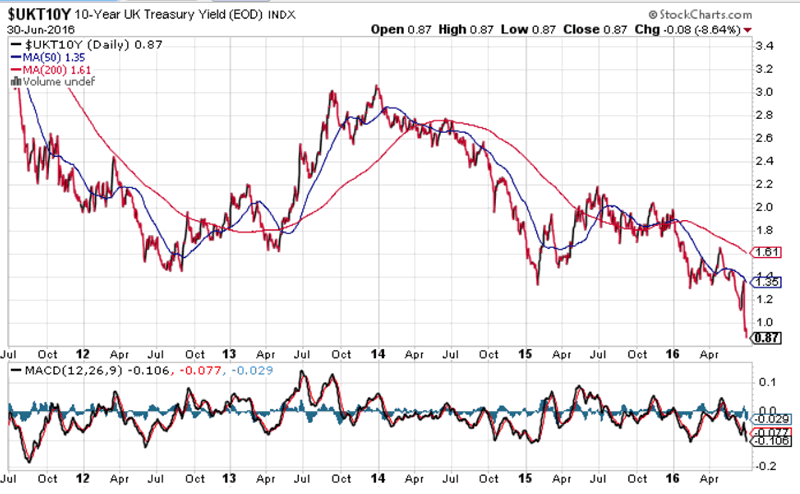
Overall the UK bond market is showing none of the signs ALL YEAR of what operation fear had been warning of i.e. for a sharp rise in interest rates.
4. UK Debt and Deficit - George Osborne's BrExit Excuse to Scrap UK Government Borrowing Targets
George Osborne Friday announced that he would be using BrExit as an excuse to scrap the cornerstone of his economic policy, one of ending this parliament with an annual budget surplus, instead now stating:
"The referendum result is as expected likely to lead to a significant negative shock for the British economy. How we respond will determine the impact on people’s jobs and on economic growth.
The Bank of England can support demand.
The government must provide fiscal credibility so we will continue to be tough on the deficit but we must be realistic about achieving a surplus by the end of this decade as precisely the flexibility that our rules provide for, and we need to reduce uncertainty by moving as quickly as possible to a new relationship with Europe and being super competitive, open for business and free trading. That’s the plan and we must set to it.”
Which is set against George Osborne's dire warnings pre-brexit outcome of an emergency tax hikes and spending cuts budget of £30 billion! When now the reality looks set to turn out to be the exact opposite i.e. more borrowing and stimulus deficit spending for the UK economy which is what the smart money in the stock market is discounting by rallying and maybe even tax cuts! So instead of a £30 billion austerity propaganda we may now see £30 billion of stimulus THIS YEAR!
However, this is just latest in a series of economic propaganda announcements as the Office of Budgetary Responsibility last dutifully pumped out economic propaganda in March 2016 of revising to increase the amount the UK government would borrow over its term in office from the original £115 billion (May 2015) to £178bn, a 54% increase in the amount they said they would borrow at the outset, and which is also set against their November 2015 revision higher to £143bn.
And as my original analysis and concluding forecast of May 2015 warned to expect far, far higher borrowings than anything that the economic propaganda mouthpiece of the government (OBR) was pumping out at the time, which I warned could end up being TRIPLE the £115 billion to as high as £350 billion, with my forecast conclusion of £315 billion, some £200 billion higher than OBR propaganda of £115 billion.
20 May 2015 - UK Deflation Warning - Bank of England Economic Propaganda to Print and Inflate Debt
New Conservative Government Debt Fantasy
Just as the Coalition government ended up borrowing over £200 billion more than it forecast it would so we can also take the new Conservative governments pledge / promise / forecast / hopes / dream to turn today's £90 billion annual deficit into a fantasy land £5 and £7 billion surpluses in their last 2 years in office, that is just not going to happen!
- 2014-15 : £90.2bn
- 2015-16 : £75.3bn
- 2016-17 : £39.4bn
- 2017-18 : £12.8bn
- 2018-19 : £5.2bn surplus
- 2019-20 : £7bn surplus
Therefore instead of borrowing £115 billion over the next 5 years, I would not be surprised if the so called economic austerity Conservative government actually ends up borrowing TRIPLE the amount i.e. the actual amount borrowed will be closer to £350 billion rather than propaganda of £115 billion.
My forecast conclusion is for the Conservative government to again borrow at least £200 billion more than the OBR is forecasting today i.e. At least +£315 billion by March 2020 as illustrated by the graph with the risk that borrowing could turn out to be as high as +£350 billion which is set against the OBR/ governments forecast of just +£115bn.
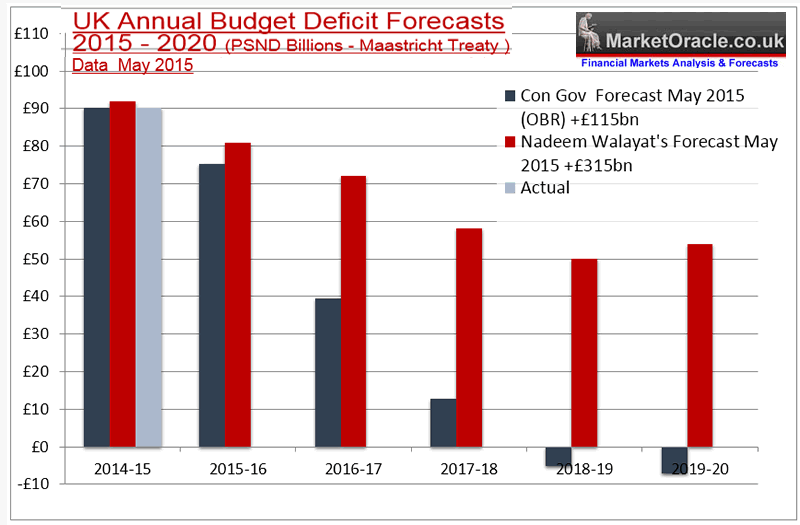
So whilst the George Osborne now once more ups UK borrowing, which will perhaps go £50 billion higher than OBR's March 2016 increase from £115 billion to £178 billion, so the next likely target announced will be at least £225billion. However this would still be £80 billion LESS than my forecast of £315 billion as the following graph illustrates, as the Government plays a perpetual game of smoke and mirrors played on the general public.
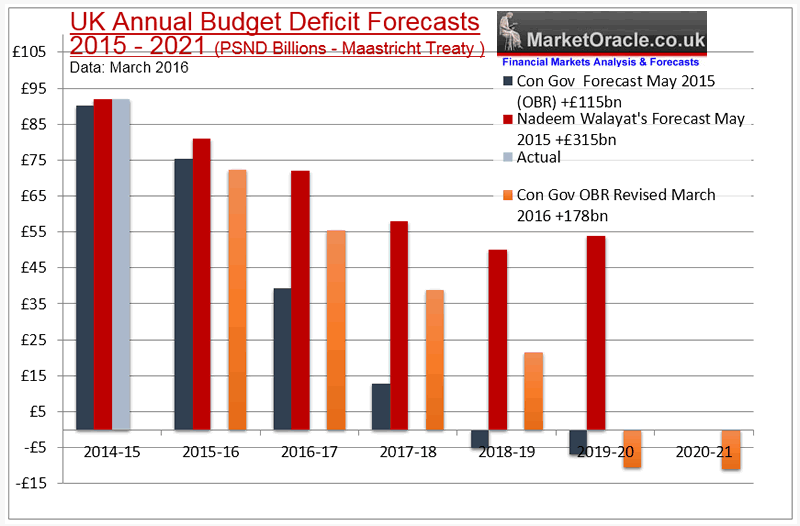
For more on my March budget analysis of government borrowing then see the following video:
But of course the real debt burden is not that which the headline figures imply as a consequence of what I termed as the Quantum of Quantitative Easing (July 2012 The Quantum of Quantitative Easing Inflation is Coming!) that explained in detail where this game of money and debt printing is going in terms of the REAL debt burden, which basically means that the real UK debt burden is about 30% lower than the actual reported debt to GDP ratio suggests because of the fact that the government is paying interest to itself via the Bank of England which in effect acts to cancel 30% of the public debt, which is why the Debt to GDP ratios that academic economists tend to obsess over are meaningless as a consequence of the Quantum of Quantitative Easing, which is why they cannot see the inflationary consequences of what is going on in the asset markets. Know this that the Quantum of Quantitative Easing is PERMANENT, so whilst the monetized debt may still officially exist, it HAS in effect been cancelled because it will NEVER be repaid but instead rolled over in perpetuity as Inflation does its job of eroding away ALL of its value.
For more on the UK economy and prospects for interest rates for over the next 2 years then see my recent in-depth analysis (06 Feb 2016 - UK Interest Rates, Economy GDP Forecasts 2016 and 2017 ) and accompanying video:
The bottom line is that George Osborne was NEVER going to achieve his target for a budget surplus by 2020! Therefore expect the government's department for economic propaganda to now use the BrExit excuse to keep revising the amount the government is expected to borrow higher every year by at least another £135 billion this parliament all the way towards when the Governments £115 billion original target morphs into the reality of at least £315 billion as per my long standing UK government borrowing forecast.
5. UK BrExit Inflation Forecasts Spike CPI to 3%, RPI 4%
Whilst official UK CPI Inflation continues to hug near 0% at a rate of just 0.3% for May 2016, meanwhile RPI which is the closest official measure to real inflation has continued to nudge higher to 1.4%, which are set against the demand adjusted Real UK inflation rate of 1.8%. So deflation? Not really, real UK price Inflation is actually well above 1% and was already trending towards 2% before BrExit.
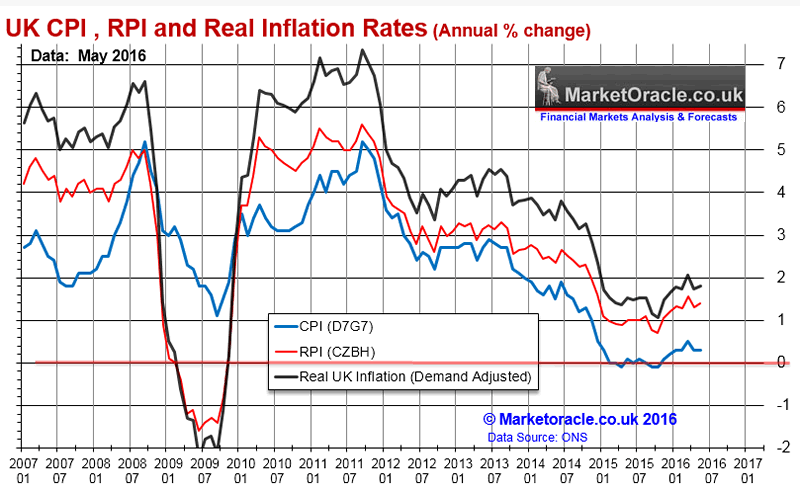
So what are the future prospects for UK inflation following BrExit?
We'll it's not really that complicated to figure out, for we currently have twin factors that look set to drive UK inflation sharply higher over the next 12 months:
Firstly ,there has been the sharp depreciation in sterling of about 12% which instantly increases the price of imports and therefore should be having an immediate effect on inflation. However, unless the slide in sterling continues then this inflation should prove temporary and start to come out of the inflation indices a year from now.
Secondly there are the longer terms consequences of increased deficit spending stimulus for the UK economy as George Osborne abandons his economic policy of working towards a a budget surplus by 2020 but instead looks set to go on an economy boosting deficit spending spree.
Therefore both of these factors look set to drive UK CPI inflation significantly higher to above CPI 2% and very probably to spike above 3% early 2017, and RPI probably spiking above 4%. However, beyond that unless the surge in inflation triggers significant wage inflation then CPI inflation should then soon start retreat to back below 2% and the trend towards that of the inflation rate of the US at that time a year from now.
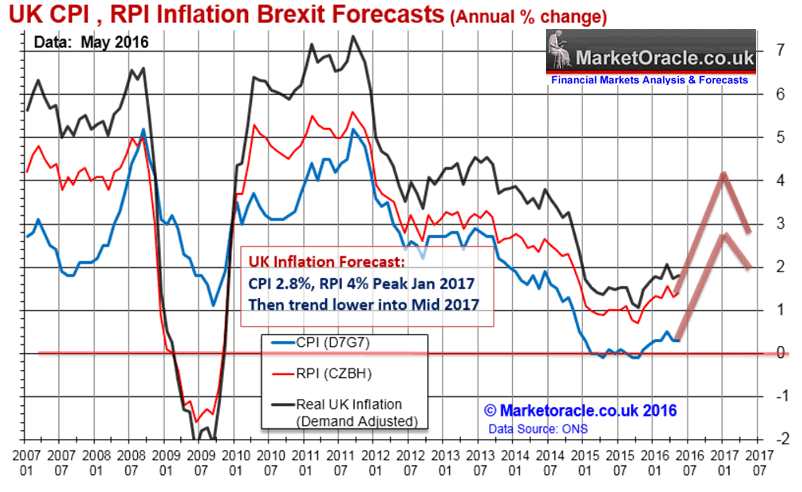
So the bottom line is that despite brexit inducing economic weakness, expect UK CPI Inflation to spike towards 3% and RPI to above 4% by early 2017, probably peaking for January 2017 data before trending lower into mid 2017.
Now before you all start panicking you need to realise that in effect nothing has really changed where inflation is concerned for we remain firmly immersed in an exponential inflation mega-trend of which the rise to 4% RPI would just mark the continuation of, where even the great deflation of the great recession of 2008 to 2009 is a mere blip on a long-term inflation trend.
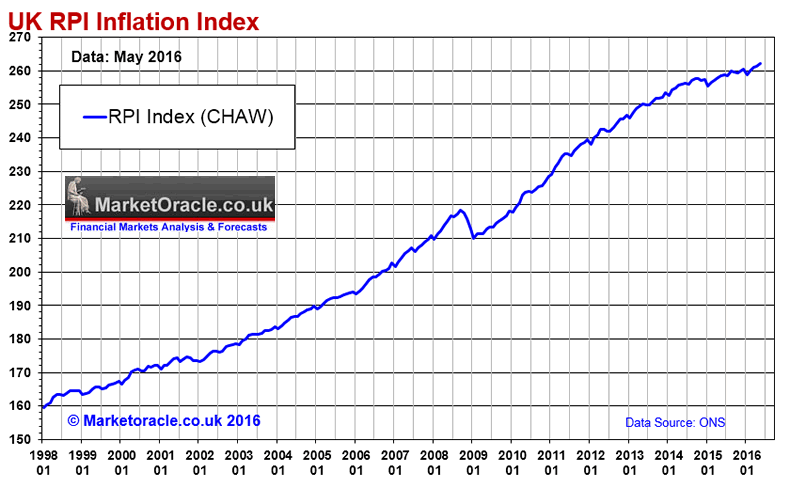
For those who think that the sharp rise in inflation could trigger a rise in interest rates, then I would like to remind you all that inflation of above 5% of just a few years ago failed to prompt a Bank of England to raise rates due to the bank being terrified that its banking sector brethren would go bust again like 2008. So no rate hikes despite the rise in inflation which means savers are about to get screwed as savings rates FALL whilst inflation RISES.
This extensive analysis continues in Part 2 - http://www.marketoracle.co.uk/Article55772.html :
6. British Pound - BrExit Wins Britain Currency War!
7. BrExit Stock Market Upwards Crash as FTSE Recovers Friday Plunge and More!
8. UK House Prices BrExit Crash NOT Likely Despite London Property Market Weakness
9. UK Politics - Boris Johnson Brexecuted by 'Little Finger'
10. EU Does Not Want Scotland
And ensure you are subscribed to my always free newsletter for ongoing in-depth analysis and forecasts.
Your Independence Day Analyst who expects over time more and more people will come to realise that Britain really did make the RIGHT decision to LEAVE the EU.
Source and Comments: http://www.marketoracle.co.uk/Article55771.html
By Nadeem Walayat
Copyright © 2005-2016 Marketoracle.co.uk (Market Oracle Ltd). All rights reserved.
Nadeem Walayat has over 25 years experience of trading derivatives, portfolio management and analysing the financial markets, including one of few who both anticipated and Beat the 1987 Crash. Nadeem's forward looking analysis focuses on UK inflation, economy, interest rates and housing market. He is the author of five ebook's in the The Inflation Mega-Trend and Stocks Stealth Bull Market series that can be downloaded for Free.
 Nadeem is the Editor of The Market Oracle, a FREE Daily Financial Markets Analysis & Forecasting online publication that presents in-depth analysis from over 1000 experienced analysts on a range of views of the probable direction of the financial markets, thus enabling our readers to arrive at an informed opinion on future market direction. http://www.marketoracle.co.uk
Nadeem is the Editor of The Market Oracle, a FREE Daily Financial Markets Analysis & Forecasting online publication that presents in-depth analysis from over 1000 experienced analysts on a range of views of the probable direction of the financial markets, thus enabling our readers to arrive at an informed opinion on future market direction. http://www.marketoracle.co.uk
Disclaimer: The above is a matter of opinion provided for general information purposes only and is not intended as investment advice. Information and analysis above are derived from sources and utilising methods believed to be reliable, but we cannot accept responsibility for any trading losses you may incur as a result of this analysis. Individuals should consult with their personal financial advisors before engaging in any trading activities.
Nadeem Walayat Archive |
© 2005-2022 http://www.MarketOracle.co.uk - The Market Oracle is a FREE Daily Financial Markets Analysis & Forecasting online publication.





